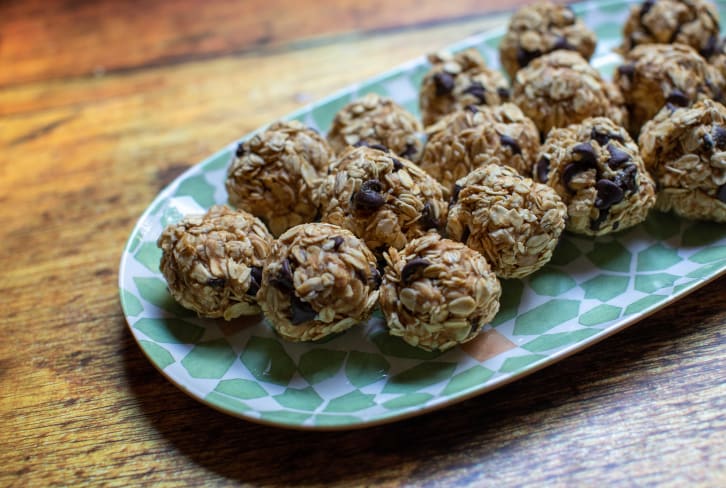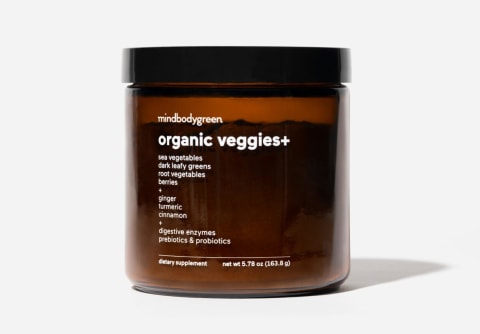Advertisement
Kelp: The Oceanic Plant With Skin, Health & Thyroid Benefits*


When you think of kelp, you probably think of slimy green seaweed, not a nutrient-dense edible seaweed. But this large brown algae that you may have seen in the ocean is a natural source of some key minerals and vitamins our bodies need and boasts potential benefits ranging from weight maintenance to bone health.*
Here's what you need to know about kelp, its health benefits, and how to take it as a supplement.
What is kelp?
Kelp is a kind of large brown algae. You might know kelp by its more colloquial moniker: seaweed. There are at least 30 different kinds of kelp, all of which grow in saltwater (primarily oceans) and thrive in cool, relatively shallow waters close to the shore. You won't often find just a little kelp, though. It grows in dense, forest-like groupings known, appropriately, as kelp forests.
Kelp plays an important role in the underwater ecosystem. Kelp forests, which grow primarily on the Pacific Coast, provide food and shelter for thousands of fish and marine mammal species. Kelp is also one of the fastest-growing plants on earth and can grow as much as 300 feet in a single year, meaning it can feed and shelter a lot of fish.
The benefits of kelp
"Kelp is often called a 'superfood from the sea' because it has 10 times more calcium than milk and more vitamin C than OJ," said Robin Berzin, M.D., functional medicine doctor and the founder of Parsley Health. "While kelp contains dozens of essential vitamins and minerals, it's difficult to find kelp on the menu and get it into one's daily diet" she told mbg. Not to worry, though, kelp can be found as a powdered supplement, and it’s easy to add to smoothies, soups, and baked goods.
Here are all the reasons you'll want to add more seaweed to your diet:
It’s a good source of vitamins and minerals
Kelp is an excellent source of vitamin K, vitamin A, vitamin B-12, calcium, iron, and magnesium. Vitamin K1 aids with bone metabolism and helps produce the protein that's key to making blood clots.* Vitamin A2 is key to so many functions in your body, from making sure you have optimal eye health to supporting the immune system and reproduction.* At the same time, it also helps the heart, lungs, kidneys, and other organs work optimally.*
It supports thyroid function.*
Kelp is one of the best natural sources of iodine3, which is essential for thyroid hormone production.* Iodine deficiency can lead to goiter—an enlargement of the thyroid gland—and metabolism disruptions4 (which can cause things like weight changes among other symptoms).*
"The recommended daily intake3 of iodine is 150 mcg for healthy adults, but if you're pregnant or breastfeeding, then your needs are higher (220 mcg and 290 mcg)," registered dietitian and nutritionist Jess Cording, M.S., R.D., CDN, says. "While iodine deficiency is pretty rare in the U.S., if you don't regularly consume iodized salt or are on a vegan diet, then you need to be more mindful to work iodine-rich foods into your regular diet. Seaweed is a great example of a plant-based food source.”
However, you should also be mindful that too much iodine can be a problem. The tolerable upper intake level5 for iodine is 1,100 mcg for adults, and consuming more than this can cause many of the same problems as consuming too little iodine6, including goiters, thyroid gland inflammation, and thyroid disorders.
Because it's such a potent source of iodine, kelp supplements are not recommended for individuals with hyperthyroidism.
It supports bone health.*
While kelp is a great source of all of the above vitamins and nutrients, its real claim to fame nutritionally is as a plant-based source of calcium—it's a better source than most vegetables, including kale.
The recommended dietary allowance (RDA) of calcium is 1,000 mg per day7 for most adults. Raw kelp8 contains 168 mg per 100 g serving or 372 mg per 100 gram serving of dried kelp9. Calcium is important for blood flow, muscle function, and bone development.*
It aids in weight maintenance.*
Kelp contains a natural fiber called alginate, which studies have found can inhibit fat absorption in the gut by 75%.* As a result, kelp is being researched as a weight maintenance supplement that could be added to foods like yogurt.* More research is needed to confirm these findings, though.
Studies suggest kelp could also help with the maintenance of healthy blood glucose10 levels.*
It could enhance longevity.*
Kelp could be the key to a long and happy life. It's a dietary staple in Japan (different kinds of kelp account for a staggering 21% of Japanese meals11), and it's been suggested that this could be a contributing factor in Japanese people's above-average life spans.* More research is needed to understand how kelp may affect longevity, but with so many benefits, it's worth adding this nutrient-rich sea veggie to your diet.*
How to eat kelp
"Since kelp is a large brown seaweed, it may not seem like the most appetizing thing, but you can try it in several different forms," Cording said. There's raw, powdered, and dried.
“If cozying up to a kelp noodle salad sounds too intimidating, then try adding powdered kelp into soups, salads, grain dishes, or even smoothies and green juices,” Cording suggests. “For a crunchy snack, enjoy it tossed with popcorn, sea salt, and a little ghee or coconut oil."
Kelp in supplements
If you're seriously considering increasing your kelp intake at this point, then know that kelp supplements come in powdered or capsule form. While both forms are effective ways to increase the amount of kelp (and all the vitamins and nutrients it carries)* in your diet, in general, powdered forms of supplements are more quickly absorbed because there is no capsule barrier to break down (and it can also be mixed into drinks, which is a plus).
Kelp in skin care
By now, it should be clear that most research supports the consumption of kelp for good health.* But overachieving kelp is also a great thing to put on your body—or at least on your skin. Brown algae has many benefits for skin12: It's high in antioxidants12 and, when applied topically, will help reduce redness and swelling. In addition, kelp is also a great moisturizer.
Finding kelp-enhanced skin care products isn't difficult. Many skin treatments and cosmetics already contain algae, both because of its specific skin benefits and because, on a purely practical production level, algae is a great industrial thickener.
So, basically, if you get a kelp (or other algae) beauty product, it's multi-tasking, helping your skin look brighter and younger and literally keeping your face cream all creamy and perfect.
A last word on kelp.
Kelp is a nutrient-dense edible brown algae. It is a good source of vitamins and minerals, especially iodine and calcium, and can support bone health, weight maintenance, and, when applied topically, skin appearance.* Kelp is available fresh, dried, and powdered. For an easy way to incorporate it into your diet, try adding the powdered form to water or smoothies.
12 Sources
- https://ods.od.nih.gov/factsheets/VitaminK-HealthProfessional/
- https://ods.od.nih.gov/factsheets/VitaminA-HealthProfessional/
- https://ods.od.nih.gov/factsheets/Iodine-HealthProfessional/
- https://www.ncbi.nlm.nih.gov/pmc/articles/PMC5471726/
- https://ods.od.nih.gov/factsheets/Iodine-HealthProfessional/#h3
- https://ods.od.nih.gov/factsheets/Iodine-Consumer/
- https://ods.od.nih.gov/factsheets/Calcium-HealthProfessional/#h2
- https://fdc.nal.usda.gov/fdc-app.html#/food-details/168457/nutrients
- https://fdc.nal.usda.gov/fdc-app.html#/food-details/343324/nutrients
- https://www.ncbi.nlm.nih.gov/pmc/articles/PMC2815322/
- https://www.ncbi.nlm.nih.gov/pmc/articles/PMC3204293/
- https://www.ncbi.nlm.nih.gov/pmc/articles/PMC3564164/
Watch Next
Enjoy some of our favorite clips from classes
Enjoy some of our favorite clips from classes
What Is Meditation?
Mindfulness/Spirituality | Light Watkins
Box Breathing
Mindfulness/Spirituality | Gwen Dittmar
What Breathwork Can Address
Mindfulness/Spirituality | Gwen Dittmar
The 8 Limbs of Yoga - What is Asana?
Yoga | Caley Alyssa
Two Standing Postures to Open Up Tight Hips
Yoga | Caley Alyssa
How Plants Can Optimize Athletic Performance
Nutrition | Rich Roll
What to Eat Before a Workout
Nutrition | Rich Roll
How Ayurveda Helps Us Navigate Modern Life
Nutrition | Sahara Rose
Messages About Love & Relationships
Love & Relationships | Esther Perel
Love Languages
Love & Relationships | Esther Perel
What Is Meditation?
Box Breathing
What Breathwork Can Address
The 8 Limbs of Yoga - What is Asana?
Two Standing Postures to Open Up Tight Hips
How Plants Can Optimize Athletic Performance
What to Eat Before a Workout
How Ayurveda Helps Us Navigate Modern Life
Messages About Love & Relationships
Love Languages
Advertisement

These Peanut Butter Cup Protein Bites Make The Perfect On-The-Go Snack
Molly Knudsen, M.S., RDN











